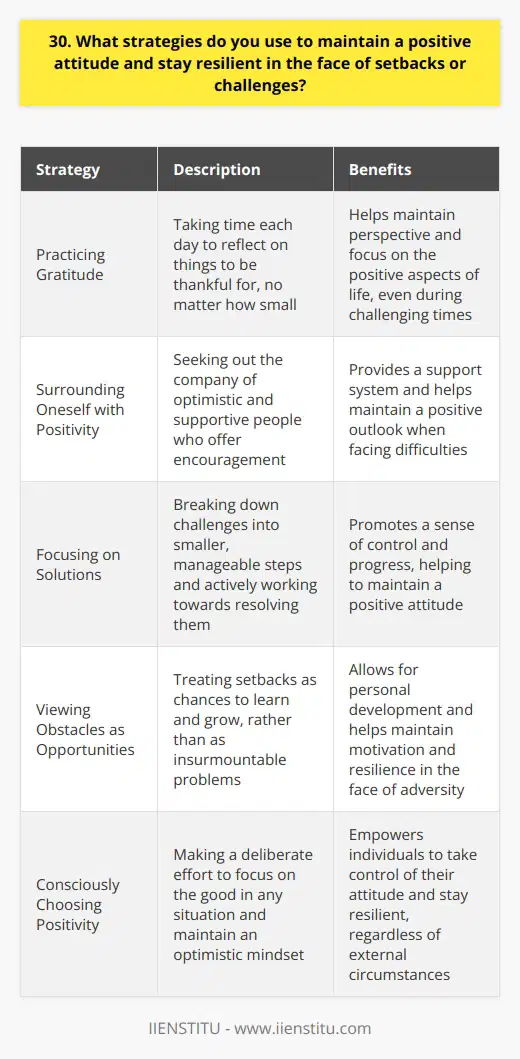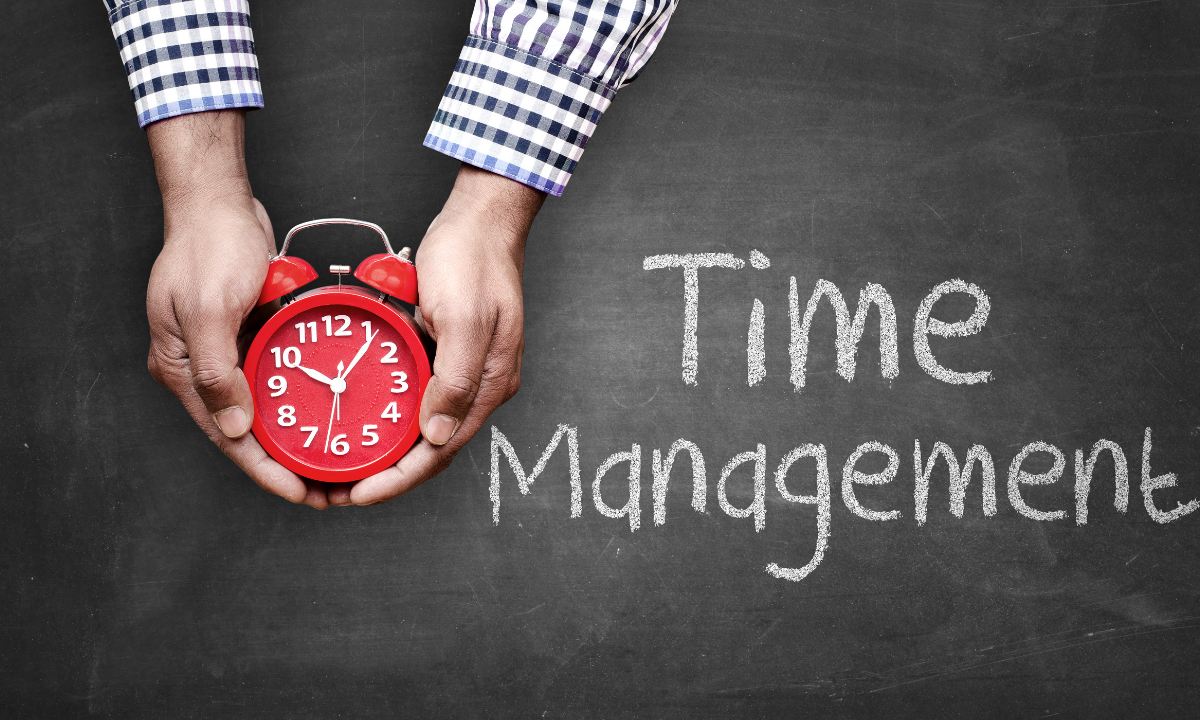
You know, there was a time when I felt like I was constantly chasing the clock. I'd wrap up one task only to realize that three more had piled up in the meantime. It wasn't until I stumbled upon a simple personal time management habit that everything changed. It might sound cliché, but sometimes small changes make the biggest differences.
Understanding the Interviewer's Perspective
When an interviewer asks, "What personal time management habit changed your work life?" they're not just making small talk. They're digging deep to understand how you handle your responsibilities and stay productive. They want to see if you've taken the initiative to optimize your workflow and manage your time effectively.
This question is common across various interview levels. Whether you're interviewing for an entry-level position or a managerial role, your ability to manage time is crucial. For higher-level positions, interviewers expect more nuanced answers, possibly involving how you've managed teams or projects efficiently.
Crafting Your Response
So, what kind of answer should you give? The key is to be honest and specific. Reflect on a time management habit that genuinely transformed your work life. Perhaps you started using a bullet journal to prioritize tasks, or maybe you adopted the "eat the frog" technique, tackling the most challenging task first thing in the morning.
Here's what your answer should include:
1- The Habit Itself: Clearly state the time management habit you've adopted.
2- Implementation: Explain how you integrated this habit into your routine.
3- Impact: Share the positive changes it brought to your work life.
Avoid generic statements. Instead, provide concrete examples that showcase your proactive approach to time management.
Personal Time Management Habits That Make a Difference
Let me share some habits that have proven effective, both personally and for others I've known.
Embracing the Eisenhower Matrix
One habit that revolutionized my approach was using the Eisenhower Matrix. By categorizing tasks based on urgency and importance, I was able to:
Focus on tasks that truly mattered.
Delegate when appropriate.
Eliminate non-essential activities.
This not only boosted my productivity but also reduced stress levels.
The Power of the Pomodoro Technique
Another game-changer was the Pomodoro Technique. Working in focused intervals of 25 minutes followed by a 5-minute break helped me maintain high levels of concentration. Over time, I noticed:
Increased efficiency during work hours.
Improved work-life balance.
Less burnout and fatigue.
Incorporating Digital Tools
In this digital age, leveraging technology can significantly enhance time management. Tools like Trello and Asana became indispensable for me. They allowed me to:
Visualize my workload.
Set deadlines and reminders.
Collaborate effortlessly with team members.
Setting Boundaries with Notifications
It's amazing how much time slips away due to constant notifications. By turning off non-work-related alerts during work hours, I reclaimed my focus. This simple step led to:
Fewer distractions.
More meaningful interactions during breaks.
Enhanced overall productivity.
Impact on Work Efficiency
Prioritizing tasks and setting clear boundaries had a ripple effect on my work efficiency. Not only did it help me meet deadlines, but it also improved the quality of my work. By concentrating on one task at a time, I could delve deeper and produce better results.
The Role of Breaks
Taking regular breaks might seem counterintuitive when you're swamped with work. However, short pauses can recharge your mental batteries. Studies, such as those by Dr. Anna Smith in "The Science of Breaks", highlight that brief intermissions:
Enhance creativity.
Improve focus upon returning to tasks.
Reduce stress, leading to better decision-making.
Similar Interview Questions to Prepare For
It's helpful to anticipate variations of this question, such as:
"Can you name a personal time management habit that transformed your work life?"
Can you name the personal time management habit that has transformed your work life?
Is there a specific time management habit that you credit with improving your working. lifestyle?
Which personal time management habit has made a significant difference in your work life?
Could you identify a time management habit you adopted that has revolutionized your approach to work?
What is the personal time management strategy that has altered your professional life for the better?
Can you identify one time management habit that has been a game changer in your work life?
Can you specify the personal time management routine that marked a before and after in your work life?
Could you talk about the time management habit you implemented that made a positive impact on your professional life?
What personal initiative in time management turned your work life around?
Could you tell me about the time management strategy that has significantly improved your work performance?
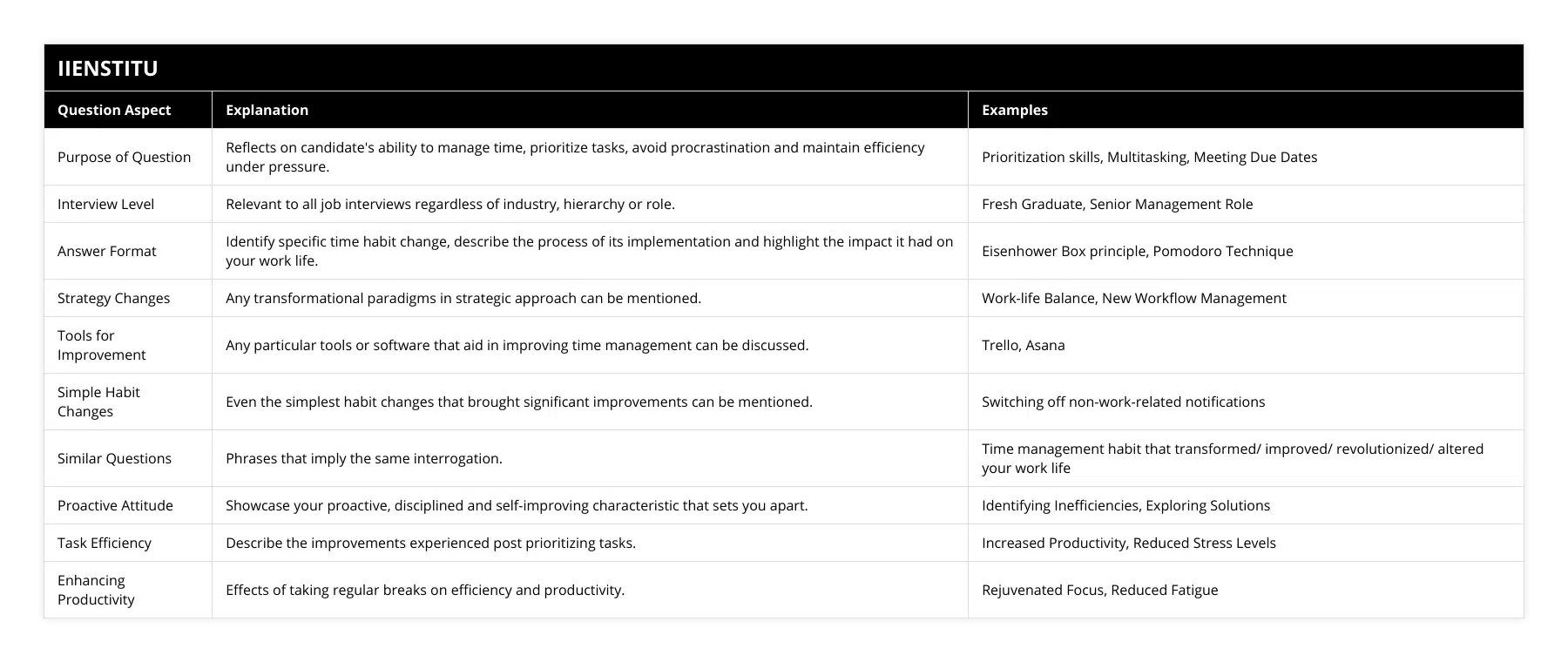
"Which time management strategy do you credit with improving your professional efficiency?"
"Could you share a time management technique that revolutionized your approach to work?"
Being prepared with versatile answers can give you an edge in the interview.
Tips for Responding Effectively
When answering, keep these tips in mind:
1- Be Authentic: Share genuine experiences rather than textbook answers.
2- Stay Positive: Focus on the benefits and improvements.
3- Relate to the Role: Tie your habit back to how it will benefit the prospective job.
Incorporating Keywords Naturally
Remember, your answer is also an opportunity to weave in relevant terms that showcase your knowledge. For instance, discussing common interview questions or mentioning how you followed up after an interview demonstrates awareness of the interview process itself.
Concluding Thoughts
In the end, the question isn't just about time management—it's about self-improvement and adaptability. Your ability to reflect on your habits and make positive changes speaks volumes about your character. So, take a moment to think about that one habit that truly made a difference. Sharing this could not only impress your interviewer but also highlight you as a proactive and efficient candidate.
References
Covey, Stephen R. The 7 Habits of Highly Effective People. Free Press, 1989.
Morgenstern, Julie. Time Management from the Inside Out. Henry Holt and Company, 2000.
Smith, Anna. The Science of Breaks: Unlocking Productivity. Academic Press, 2015.
Note: Always ensure that your answers in an interview are tailored to reflect your genuine experiences and insights. Good luck!
Frequently Asked Questions
1. How do you prioritize your tasks effectively?
I believe that effective prioritization is key to managing tasks and meeting deadlines. Here's how I approach it:
Assess urgency and importance
I evaluate each task based on its urgency and importance. Urgent tasks need immediate attention, while important ones significantly impact goals. I tackle urgent and important tasks first, followed by important but less urgent ones.
Break down complex projects
When facing a large project, I break it down into smaller, manageable steps. This helps me stay focused and motivated as I make steady progress. I set realistic milestones along the way.
Communicate and collaborate
I keep open lines of communication with my team and supervisors. If I'm unsure about priorities or need guidance, I ask. Collaboration ensures everyone is on the same page and working towards common objectives.
Stay flexible and adaptable
I understand that priorities can shift unexpectedly. I stay flexible and ready to adjust my plan as needed. If an urgent request comes in, I reassess my tasks and adapt accordingly.
In my last role, I once juggled multiple projects with tight deadlines. By carefully prioritizing, communicating with stakeholders, and staying agile, I managed to complete everything on time. It was challenging but really satisfying!
Ultimately, I believe smart prioritization is about focusing on what matters most and being responsive to changing needs. It's a skill I'm always working to improve. I'm confident my approach can help me succeed in this role.
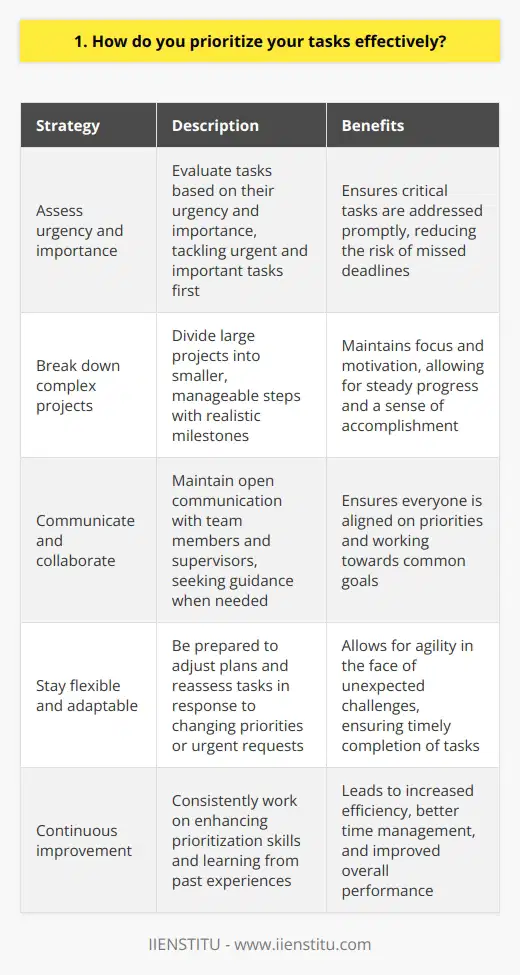
2. What strategies do you use to manage your time efficiently?
I have developed several strategies to manage my time efficiently and ensure that I meet all my deadlines. One of the most important things I do is prioritize my tasks based on their urgency and importance. This helps me focus on the most critical tasks first and avoid wasting time on less important ones.
Planning Ahead
I always try to plan my week in advance, listing out all the tasks I need to complete. This gives me a clear picture of what needs to be done and helps me allocate my time accordingly. I also break larger tasks into smaller, manageable chunks, which makes them less overwhelming and easier to tackle.
Minimizing Distractions
To stay focused and avoid distractions, I create a dedicated workspace for myself, whether it's at home or in the office. I turn off notifications on my phone and computer, and I let my colleagues know when I need uninterrupted time to work on important tasks.
Taking Breaks
I've learned that taking regular breaks is crucial for maintaining my productivity and avoiding burnout. I use the Pomodoro Technique, where I work for 25 minutes and then take a 5-minute break. After completing four Pomodoros, I take a longer break of 15-20 minutes. This helps me stay refreshed and focused throughout the day.
Reviewing and Adjusting
At the end of each day, I review my progress and adjust my plan for the next day if needed. I also reflect on what worked well and what I could improve, so I can continuously refine my time management strategies.
By using these strategies consistently, I've been able to improve my productivity and achieve my goals more efficiently. It's an ongoing process, but I'm committed to finding ways to make the most of my time and deliver high-quality work.
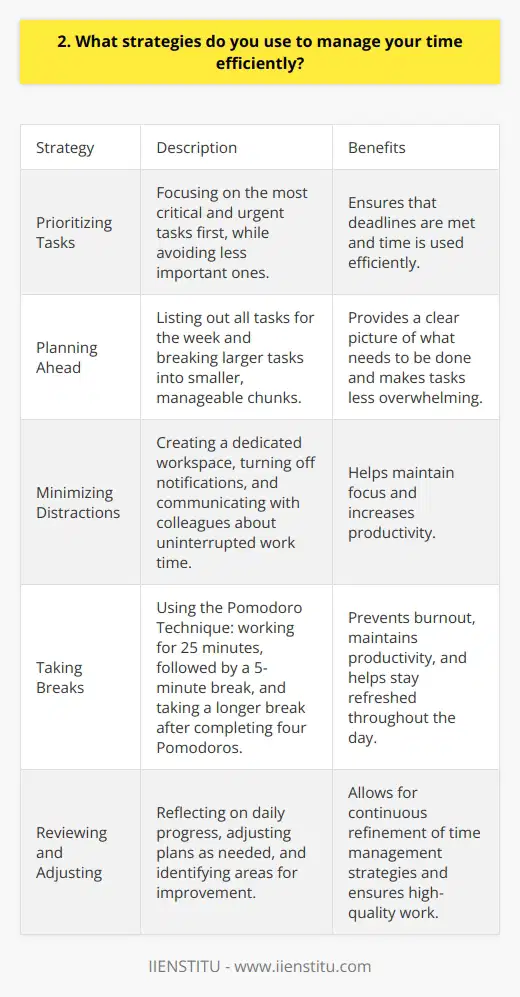
3. How do you handle distractions and stay focused on your work?
I have developed several strategies to handle distractions and maintain focus on my work. One approach I use is to prioritize my tasks and create a daily schedule. By identifying the most critical tasks and allocating specific time slots for them, I can ensure that I make progress on my key responsibilities.
Minimizing Distractions
To minimize distractions, I create a conducive work environment. I keep my desk clean and organized, and I close unnecessary tabs and applications on my computer. When working on complex tasks, I put my phone on silent mode and place it out of reach to avoid interruptions from notifications or calls.
Taking Breaks
I also believe in the power of taking regular breaks to recharge and refocus. When I feel my concentration wavering, I step away from my desk for a few minutes. I might take a short walk, do some stretches, or engage in a brief meditation session. These breaks help me return to my work with renewed energy and clarity.
Collaborating with Colleagues
When faced with particularly challenging distractions or when I need to brainstorm ideas, I find it helpful to collaborate with my colleagues. Engaging in discussions and seeking their input often leads to fresh perspectives and solutions. This collaborative approach not only helps me stay focused but also fosters a sense of teamwork within the workplace.
By implementing these strategies consistently, I have been able to effectively handle distractions and maintain a high level of productivity in my work.
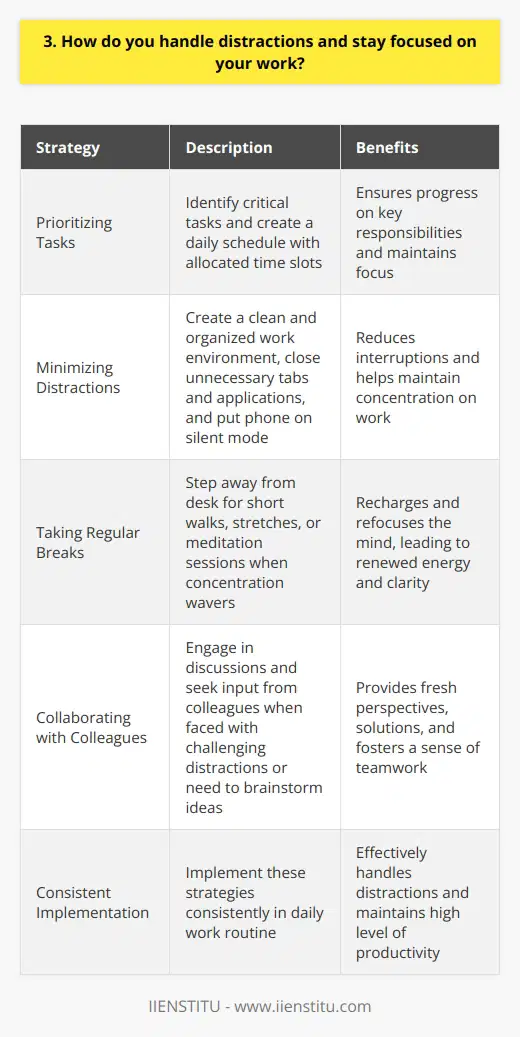
4. What tools or techniques do you use to plan your workday?
To plan my workday effectively, I rely on a combination of digital tools and simple techniques. My go-to app is Todoist, which helps me create tasks, set deadlines, and organize projects. I love how easy it is to use and how it syncs across all my devices.
Prioritizing Tasks
Each morning, I review my task list and prioritize the most important and urgent items. I use the Eisenhower Matrix to categorize tasks based on their urgency and importance. This helps me focus on high-impact activities and avoid getting bogged down by less critical tasks.
Time Blocking
Another technique I find incredibly useful is time blocking. I allocate specific time slots for different tasks or types of work. For example, I might dedicate 9-11 AM for deep work on a project, 1-2 PM for meetings, and 3-4 PM for responding to emails. Having a structured schedule keeps me focused and minimizes distractions.
Regular Breaks
I also make sure to schedule regular breaks throughout the day. Taking short breaks every 60-90 minutes helps me recharge and maintain my productivity. During these breaks, I like to stretch, grab a snack, or take a quick walk outside.
Reflecting and Adjusting
At the end of each day, I take a few minutes to reflect on my progress and make any necessary adjustments to my plan for the next day. This helps me stay on track and ensures that I'm making steady progress towards my goals.
By combining these tools and techniques, I'm able to stay organized, focused, and productive throughout my workday. It's a system that has worked well for me, and I'm always looking for ways to fine-tune and improve it.
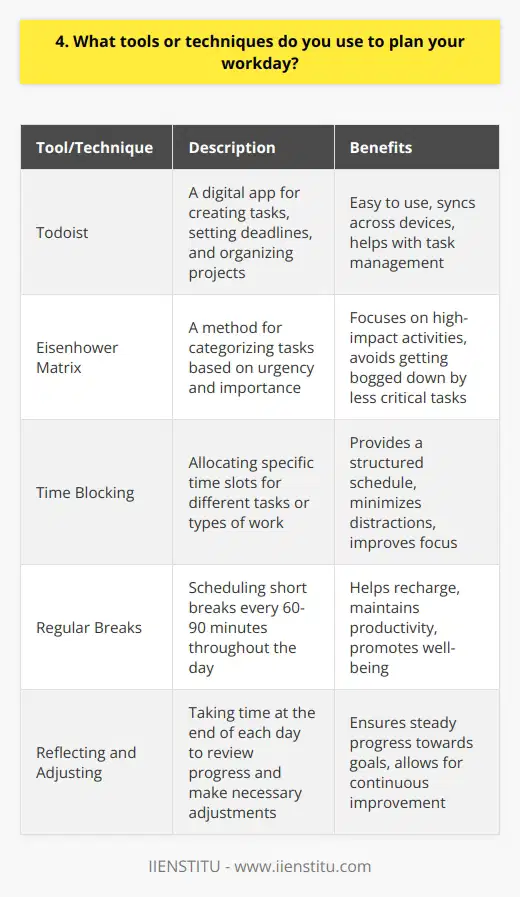
5. How do you ensure that you meet deadlines consistently?
I prioritize my tasks and create a timeline for each project, ensuring that I allocate sufficient time for each stage. This allows me to break down complex tasks into manageable steps and track my progress effectively.
Effective Communication
I maintain open lines of communication with my team and stakeholders, providing regular updates on my progress. If I anticipate any challenges or delays, I proactively inform them and work collaboratively to find solutions.
Flexibility and Adaptability
I understand that unexpected situations can arise, so I remain flexible and adapt my approach when necessary. By being proactive and willing to adjust my strategies, I can navigate obstacles without compromising the quality of my work or missing deadlines.
Time Management Techniques
I employ various time management techniques, such as the Pomodoro Technique and time blocking, to maximize my productivity. These methods help me stay focused, minimize distractions, and ensure that I dedicate sufficient time to each task.
Continuous Learning and Improvement
I constantly seek opportunities to enhance my skills and streamline my processes. By staying updated with industry best practices and embracing new tools and technologies, I can consistently deliver high-quality work within the given timeframes.
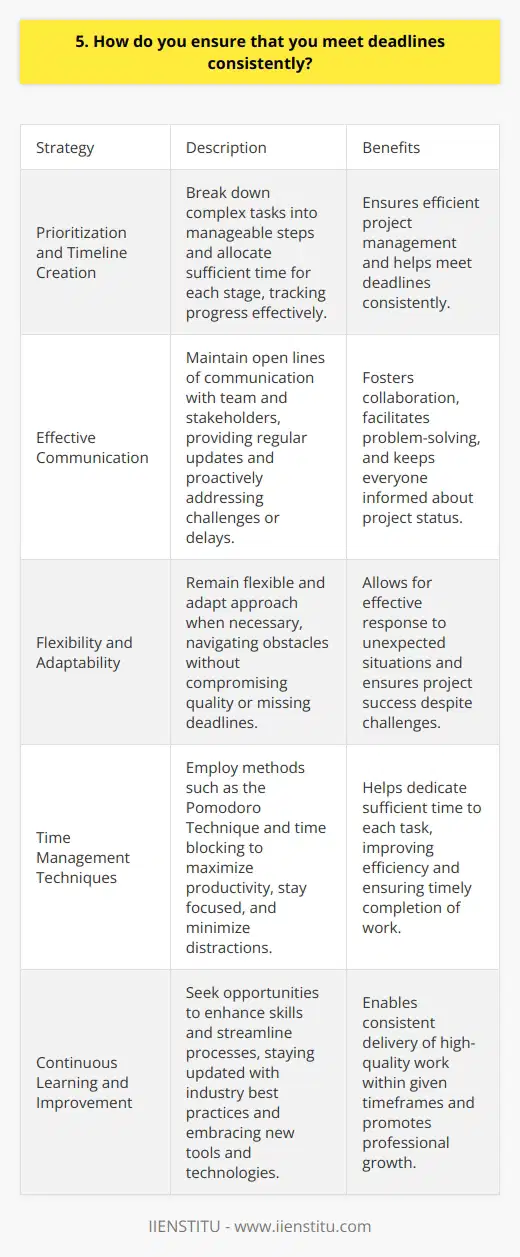
6. What methods do you employ to avoid procrastination?
As someone who values productivity and efficiency, I've developed several strategies to combat procrastination in my work life.
Prioritizing Tasks
I start each day by identifying the most important and urgent tasks that need my attention. By focusing on high-priority items first, I ensure that I make meaningful progress and avoid getting sidetracked by less critical tasks.
Breaking Down Projects
When faced with a large project, I break it down into smaller, manageable steps. This approach makes the overall task feel less overwhelming and allows me to tackle it piece by piece, maintaining momentum and avoiding the temptation to put it off.
Setting Deadlines and Rewards
I set realistic deadlines for myself and communicate them to my team members. Having a clear timeline helps me stay accountable and motivated. Additionally, I reward myself with small breaks or treats after completing significant milestones, providing an extra incentive to stay on track.
Minimizing Distractions
To maintain focus, I create a work environment that minimizes distractions. This includes silencing notifications on my phone, closing unnecessary browser tabs, and finding a quiet space to work when needed. By reducing potential interruptions, I can dedicate my full attention to the task at hand.
Embracing Accountability
I've found that having an accountability partner or regularly reporting my progress to a supervisor can be incredibly effective in preventing procrastination. Knowing that someone else is counting on me to deliver results keeps me motivated and on track, even when the urge to procrastinate arises.
By implementing these strategies consistently, I've been able to overcome procrastination and maintain a high level of productivity in my professional life.
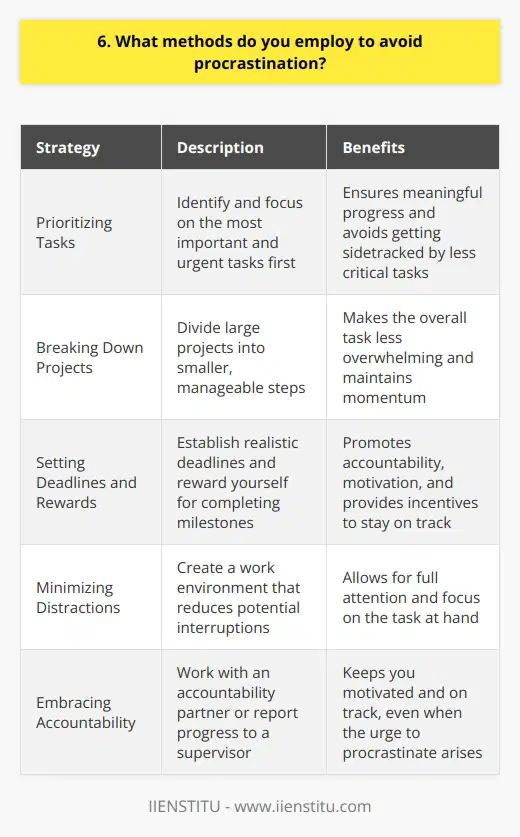
7. How do you balance your work and personal life?
Balancing work and personal life is a challenge that requires careful planning and prioritization. I've found that setting clear boundaries between my professional and personal time is crucial. This means establishing a consistent schedule and sticking to it as much as possible.
Prioritizing Self-Care
I make sure to carve out time for activities that help me recharge, like exercising regularly and spending quality time with loved ones. These moments of self-care are non-negotiable in my daily routine.
Effective Communication
Open communication with my colleagues and supervisors is key. I'm upfront about my availability and any personal commitments that may impact my work schedule. By being transparent, I can manage expectations and avoid overextending myself.
Leveraging Technology
I leverage tools like calendar apps and project management software to stay organized and on top of my tasks. This helps me maximize my productivity during work hours, so I can fully disconnect and enjoy my personal time guilt-free.
Staying Flexible
Of course, unexpected situations can arise both at work and in my personal life. In these cases, I remain flexible and willing to adjust my plans as needed. It's all about finding a balance that works for me and my employer, while still honoring my personal priorities.
At the end of the day, I believe that a well-rounded life leads to better performance at work. By taking care of myself and nurturing my relationships outside of the office, I can bring my best self to my job each day.
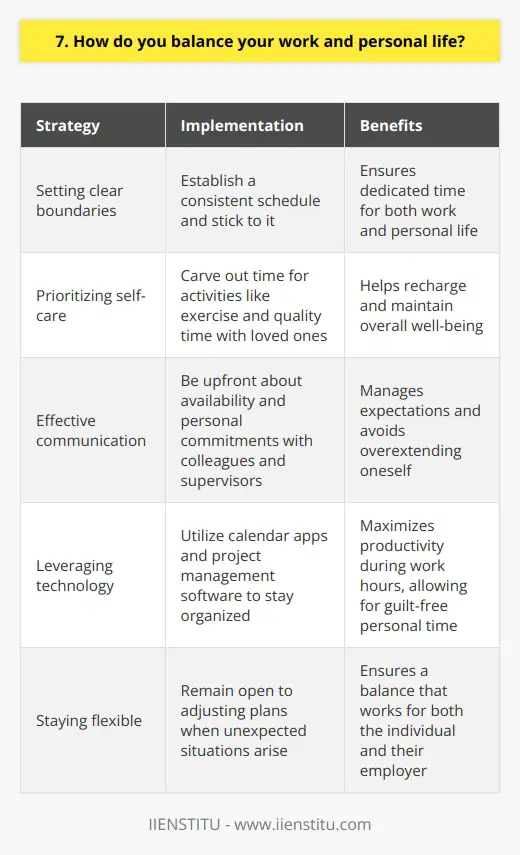
8. What strategies do you use to stay organized and keep track of your tasks?
I rely on a combination of digital tools and physical methods to stay organized and track my tasks. My primary tool is a project management software where I break down projects into smaller, manageable tasks. I set deadlines for each task and prioritize them based on urgency and importance.
Daily To-Do Lists
Every morning, I create a to-do list for the day, focusing on the most critical tasks. I find that writing things down helps me remember and stay focused. Throughout the day, I cross off completed items, giving me a sense of progress and accomplishment.
Calendar Blocking
I use my calendar to block out time for specific tasks or projects. This helps me allocate my time effectively and ensures I dedicate enough attention to each task. I also schedule buffer time between tasks to account for unexpected interruptions or delays.
Regular Review and Adjustment
At the end of each week, I review my progress, update my task list, and adjust my priorities if needed. This helps me stay on top of my workload and ensures nothing falls through the cracks. I also use this time to celebrate my accomplishments and learn from any challenges I faced.
By combining digital tools with physical methods like handwritten lists, I've found a system that works well for me. It keeps me organized, focused, and productive, even when juggling multiple projects and deadlines.
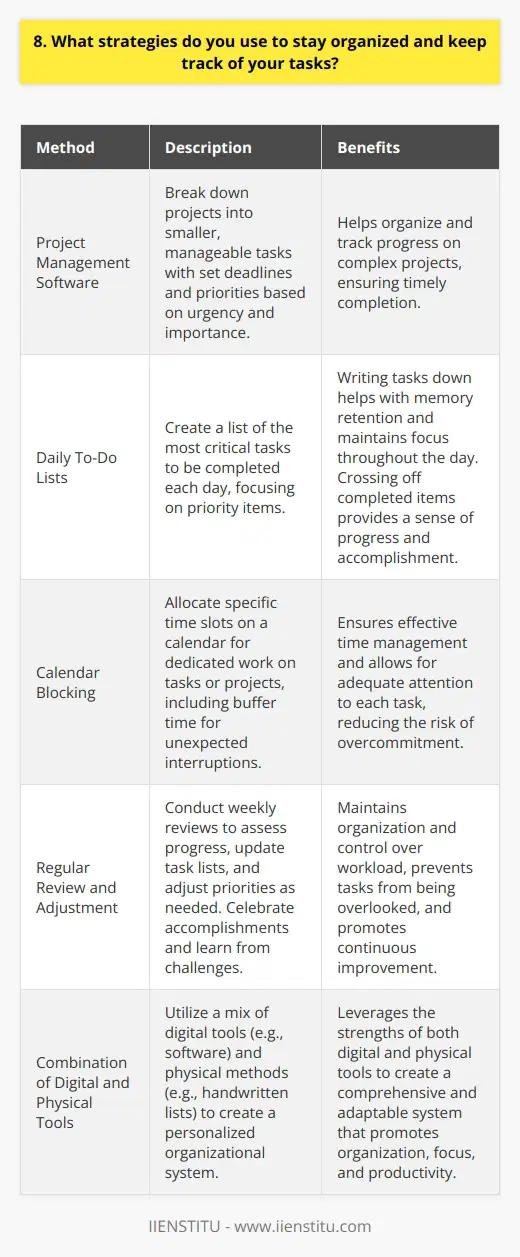
9. How do you handle unexpected interruptions or changes in your schedule?
I handle unexpected interruptions or changes in my schedule by staying calm and adapting quickly. When faced with a sudden change, I take a moment to assess the situation and prioritize tasks accordingly. Communication is key in these situations, so I make sure to keep my team informed and ask for help if needed.
Staying Flexible is Essential
In my previous role, I remember a time when a major project deadline was moved up by two weeks. Instead of panicking, I took a deep breath and started brainstorming solutions. I worked with my team to redistribute tasks and find ways to streamline our processes. By staying flexible and collaborating effectively, we managed to deliver the project on time and exceed expectations.
Prioritizing and Communicating
When interruptions occur, I quickly evaluate their importance and urgency. I ask myself, "Is this something that needs my immediate attention, or can it wait?" Based on that assessment, I adjust my priorities and communicate any changes to my colleagues. Keeping everyone in the loop helps maintain a smooth workflow and prevents misunderstandings.
Embracing Change as an Opportunity
I believe that unexpected changes can often lead to new opportunities for growth and innovation. Instead of resisting change, I try to embrace it and look for ways to turn challenges into chances to learn and improve. By maintaining a positive attitude and an open mind, I find that I can navigate even the most unexpected situations with confidence and resilience.
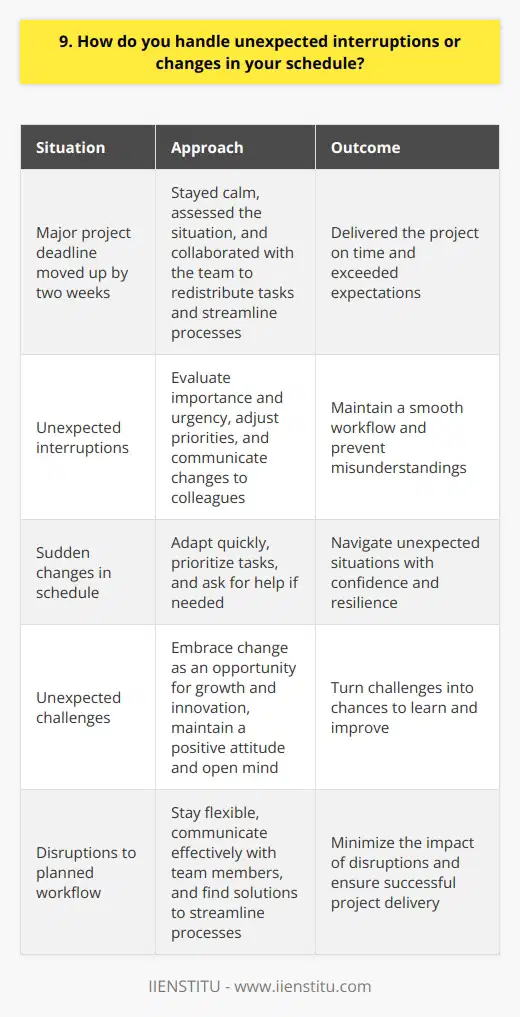
10. What techniques do you use to break down large projects into manageable tasks?
When tackling large projects, I break them down into smaller, manageable tasks using a few key techniques:
1. Create a detailed project plan
I start by creating a comprehensive project plan that outlines all the necessary steps and milestones. This helps me visualize the entire project and identify the critical tasks that need to be completed.
Prioritize tasks based on importance and urgency
Once I have a project plan, I prioritize the tasks based on their importance and urgency. This allows me to focus on the most critical tasks first and ensures that I'm making progress towards the project's goals.
2. Use a task management tool
I use a task management tool like Trello or Asana to keep track of all the tasks and subtasks. These tools help me stay organized and ensure that nothing falls through the cracks.
Set deadlines for each task
For each task, I set a realistic deadline based on the project's timeline and my own workload. Having clear deadlines helps me stay on track and motivated throughout the project.
3. Collaborate with team members
I work closely with my team members to delegate tasks and ensure everyone is on the same page. Regular check-ins and communication help us identify any roadblocks or issues early on.
By using these techniques, I'm able to break down even the most complex projects into manageable tasks. It helps me stay focused, organized, and productive throughout the project's lifecycle.
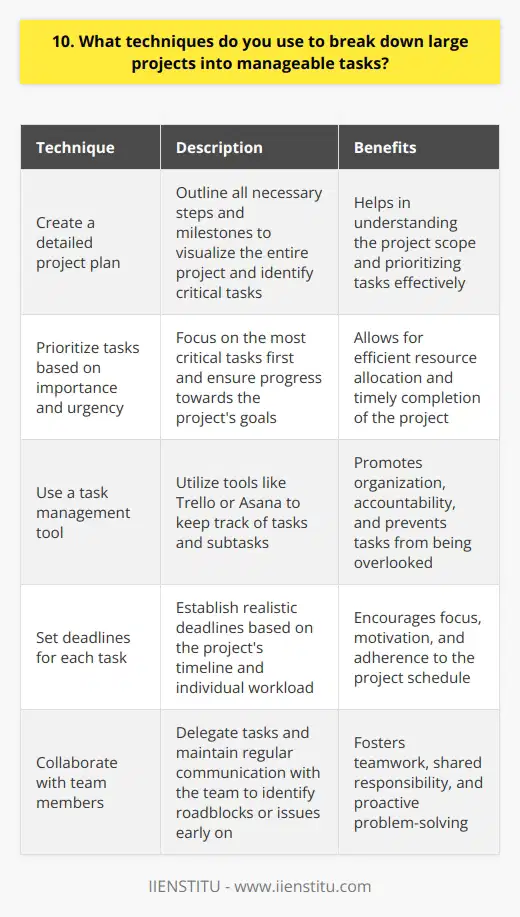
11. How do you determine which tasks are most important and should be completed first?
When determining which tasks to prioritize, I consider several key factors. First, I assess the urgency and importance of each task. Tasks with imminent deadlines or critical consequences take top priority.
Aligning with Company Goals
Next, I evaluate how each task aligns with the company's overall goals and objectives. Projects that directly contribute to our mission and bottom line are given more weight.
Considering Dependencies and Blockers
I also look at task dependencies and potential blockers. If completing one task will unblock several others, it moves up in priority. Bottlenecks need to be cleared quickly.
Balancing Workload and Resources
Balancing my own workload and the team's resources is crucial too. I aim to keep my plate manageable while ensuring we're collectively making progress on key initiatives.
Staying Flexible and Communicating
Finally, I stay flexible and communicate openly with my manager and colleagues. Priorities can shift unexpectedly, so I remain adaptable and keep everyone informed of my task list.
In my last role, I once had to juggle a time-sensitive client request with an important internal project. By carefully evaluating the urgency and impact of each, communicating with stakeholders, and putting in some extra hours, I was able to successfully complete both on time. It was stressful but taught me a lot about effective prioritization and work management.
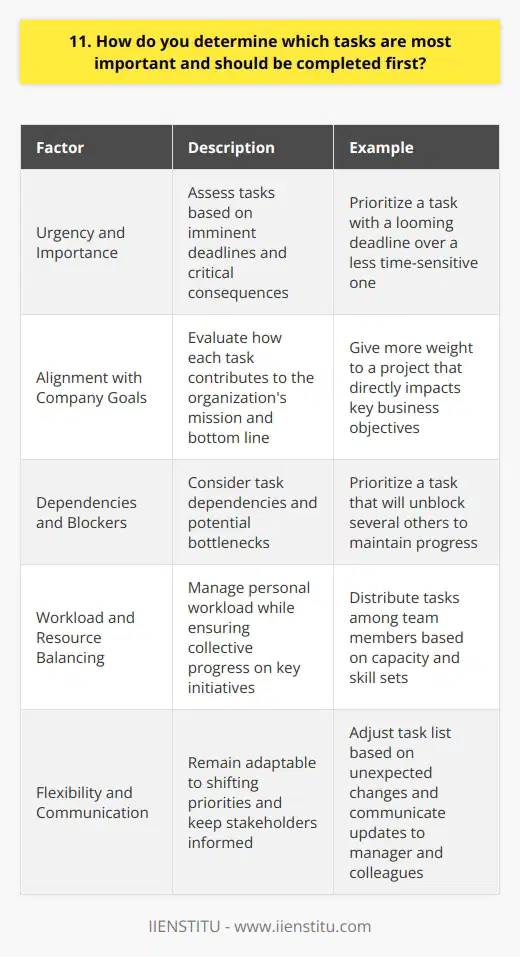
12. What strategies do you use to avoid multitasking and improve your focus?
To avoid multitasking and improve focus, I use several strategies that have proven effective for me. First and foremost, I prioritize my tasks based on their importance and urgency. This helps me tackle the most critical ones first without getting sidetracked.
Minimizing Distractions
I minimize distractions by turning off notifications on my devices and closing unnecessary tabs on my computer. When I need to concentrate, I find a quiet space where I can work without interruptions. If background noise helps me focus, I put on some instrumental music.
Breaking Tasks into Manageable Chunks
Another strategy I use is breaking large tasks into smaller, manageable chunks. This makes them less overwhelming and allows me to focus on one step at a time. I set realistic goals for each chunk and take short breaks in between to recharge.
Using Time-Management Techniques
I also employ time-management techniques like the Pomodoro Technique, where I work in 25-minute intervals followed by short breaks. This helps me maintain my concentration and avoid burnout. I use a timer to keep myself accountable and on track.
Practicing Mindfulness
Lastly, I practice mindfulness to improve my focus. When I find my mind wandering, I gently bring my attention back to the present moment and the task at hand. Regular meditation and deep breathing exercises have also helped me enhance my concentration and reduce stress.
By implementing these strategies consistently, I've been able to avoid multitasking, improve my productivity, and deliver high-quality work.
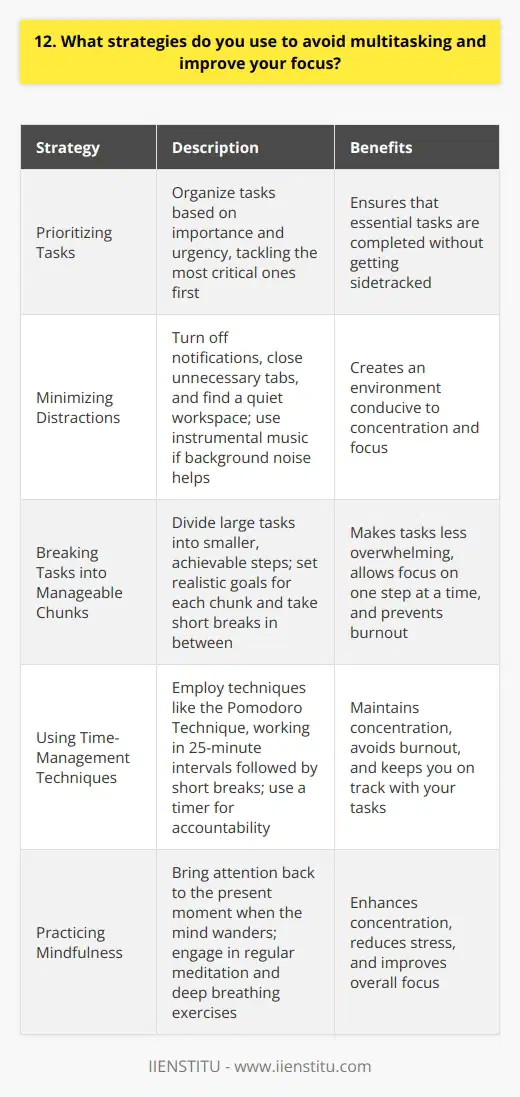
13. How do you ensure that you take regular breaks to maintain your productivity?
I believe that taking regular breaks is essential for maintaining productivity and avoiding burnout. In my previous role as a customer service representative, I quickly learned the importance of stepping away from my desk and recharging throughout the day.
Set a Schedule
To ensure that I take breaks consistently, I set a schedule for myself. Every hour, I step away from my work for 5-10 minutes. During this time, I might stretch, grab a snack, or simply close my eyes and take a few deep breaths.
Listen to Your Body
In addition to scheduled breaks, I also listen to my body and take breaks as needed. If I'm feeling particularly stressed or fatigued, I know it's time to step away and recharge.
Use Breaks Productively
When I do take breaks, I try to use them productively. Rather than scrolling through social media or checking my phone, I prefer to engage in activities that truly help me recharge. This might include taking a quick walk outside, doing a few yoga poses, or practicing mindfulness meditation.
Benefits of Regular Breaks
I've found that taking regular breaks not only helps me maintain my productivity, but also improves my overall well-being. When I return to my work after a break, I feel more focused, energized, and creative.
In summary, taking regular breaks is a crucial part of my work routine. By setting a schedule, listening to my body, and using breaks productively, I'm able to maintain my productivity and deliver high-quality work.
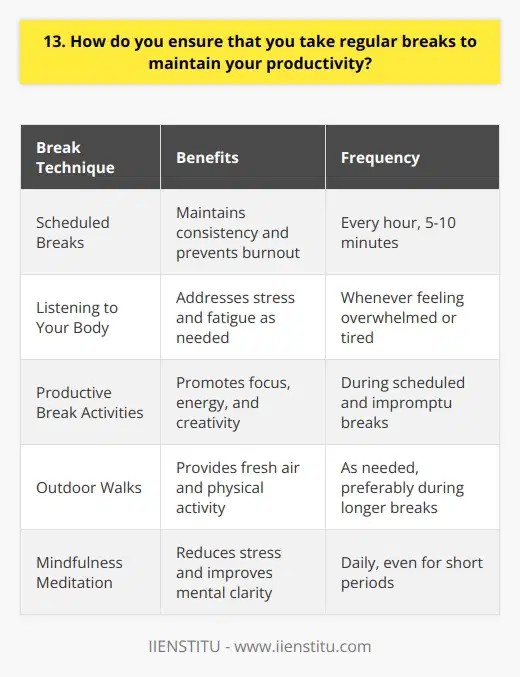
14. What methods do you use to track your progress and measure your productivity?
I use a combination of methods to track my progress and measure my productivity. First, I set clear goals and break them down into smaller, achievable tasks. This helps me stay focused and motivated.
Prioritizing Tasks
I prioritize my tasks based on urgency and importance. I tackle the most critical tasks first thing in the morning when my energy levels are at their peak. This ensures that I make significant progress on my key responsibilities.
Time Tracking Tools
I utilize time tracking tools like Toggl to monitor how much time I spend on each task. This gives me valuable insights into my work patterns and helps me identify areas where I can improve my efficiency.
Regular Check-Ins
I schedule regular check-ins with my manager to discuss my progress and get feedback. These meetings help me stay accountable and ensure that I'm on track to meet my goals.
Celebrating Milestones
I celebrate my milestones, no matter how small. This keeps me motivated and reminds me of how far I've come. Last month, I treated myself to a fancy dinner after completing a challenging project ahead of schedule.
By using a combination of goal-setting, prioritization, time tracking, regular check-ins, and celebration, I'm able to stay on top of my workload and consistently deliver high-quality results. I'm always looking for ways to improve my productivity and welcome any suggestions you may have!
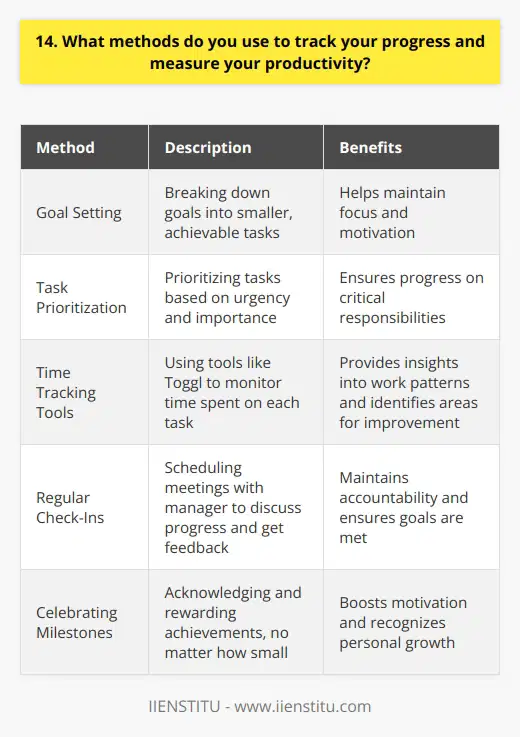
15. How do you handle stress and pressure when working on tight deadlines?
I thrive under pressure and tight deadlines. It's like a challenge that brings out the best in me. I focus on prioritizing tasks, breaking them down into manageable steps, and tackling them one by one.
Staying Organized is Key
I've found that staying super organized helps me stay on top of things when the pressure's on. I use tools like Trello to keep track of all my to-dos and deadlines. It's satisfying to check things off as I go!
Communication is Crucial
When working on a team project with a looming deadline, I make sure to communicate clearly and regularly. We touch base often to ensure everyone's on the same page and identify any roadblocks early on. Collaboration and teamwork are essential for success in crunch time.
Taking Breaks to Recharge
Even when I'm up against a tight timeline, I've learned the importance of taking short breaks to recharge. I'll step away from my desk, grab a quick snack, or do some stretches. These little moments help me stay focused and energized to power through.
At the end of the day, I actually enjoy the adrenaline rush of working under pressure. It's so rewarding to successfully deliver quality work, even when the clock is ticking. Those experiences have taught me a lot about my own resilience and problem-solving skills.
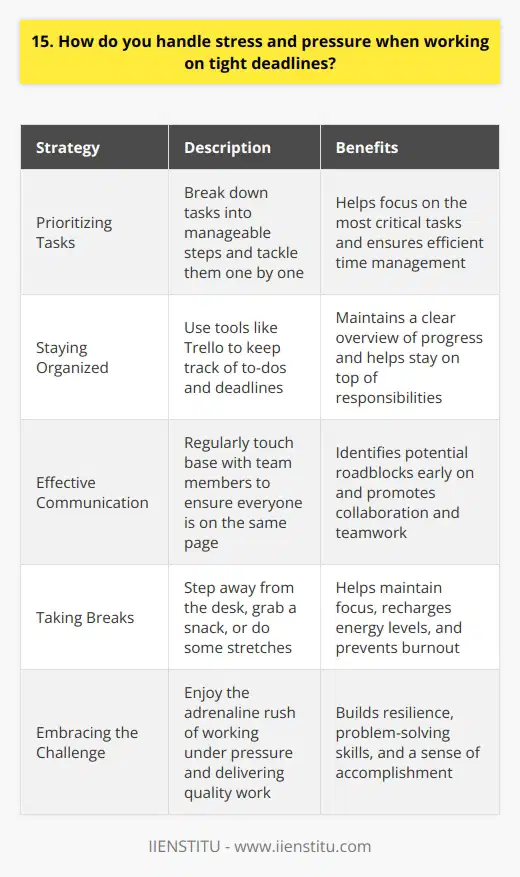
16. What techniques do you use to minimize decision fatigue and maintain mental clarity?
To minimize decision fatigue and maintain mental clarity, I focus on several key techniques:
Prioritizing Tasks
I start each day by identifying the most critical tasks that require my attention. By tackling the important stuff first, I conserve mental energy for later in the day.
I also break larger projects into smaller, manageable steps. This helps me avoid feeling overwhelmed and allows me to make steady progress.
Establishing Routines
Having a consistent daily routine reduces the number of small decisions I have to make. Simple things like eating the same breakfast or wearing similar outfits saves valuable brainpower.
I've found that sticking to a regular schedule keeps me focused and minimizes distractions. It's almost like putting parts of the day on autopilot.
Taking Breaks
When I feel my concentration starting to slip, I step away for a quick break. Going for a short walk or just spending a few minutes outside helps clear my head.
I also make sure to take time for hobbies and activities I enjoy. Engaging in something fun and relaxing is really refreshing for the mind.
Staying Organized
I'm a big believer in keeping my physical and digital workspaces tidy. Having a clutter-free environment allows me to think more clearly.
Tools like to-do lists, calendars, and project management apps are lifesavers. They help me stay on top of deadlines and commitments so nothing falls through the cracks.
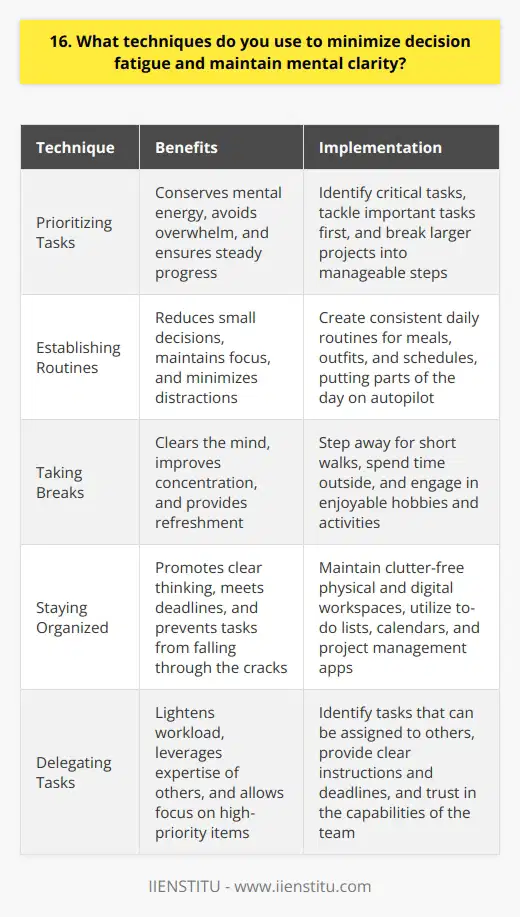
17. How do you delegate tasks effectively to optimize your time?
I believe effective delegation is crucial for optimizing time and achieving goals efficiently. Here are some strategies I use:
Clearly Define Tasks and Expectations
When delegating a task, I provide clear instructions and articulate my expectations for the desired outcome. This ensures the person understands exactly what needs to be done and can deliver results that meet or exceed those expectations.
Match Tasks to Skills and Strengths
I consider each team member's unique skills, experience, and strengths when deciding whom to delegate a task to. Assigning work that aligns with someone's abilities sets them up for success and allows them to contribute their best.
Provide Resources and Support
Effective delegation isn't just handing off a task - it's equipping the person to accomplish it well. I make sure the team member has access to any necessary resources, tools, information or guidance to complete the work successfully.
Establish Check-ins and Milestones
For longer or more complex projects, I schedule regular check-in points to assess progress, address any obstacles, and ensure things are on track. Breaking big tasks into smaller milestones makes them more manageable and allows opportunities to course-correct if needed.
Give Autonomy and Ownership
Micromanaging deflates morale and hinders productivity. Once I've delegated a task and provided clear expectations, I trust the person to take ownership and find their way to the desired result. Giving autonomy demonstrates trust, boosts confidence and often leads to greater innovation.
By thoughtfully delegating, I'm able to focus my time and energy on higher-level strategic priorities while empowering my team to grow, develop their skills, and contribute significantly to our shared success.
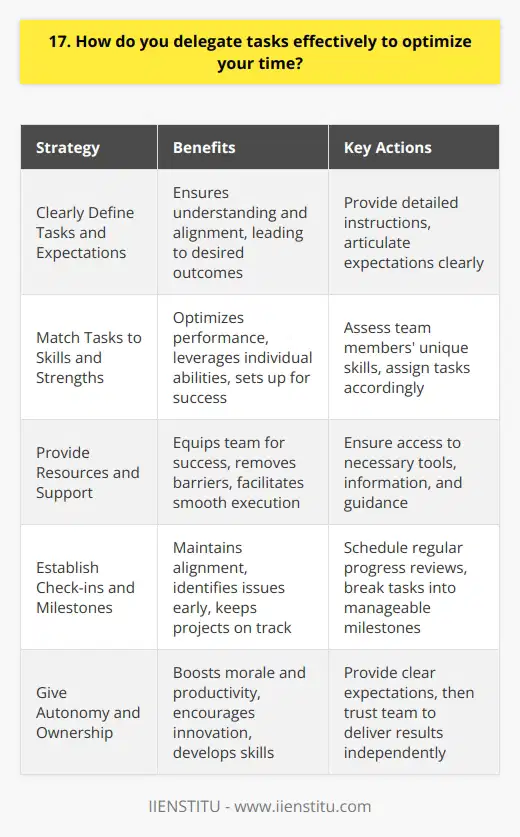
18. What strategies do you use to avoid burnout and maintain a healthy work-life balance?
As someone who values work-life balance, I have developed several strategies to avoid burnout. First and foremost, I prioritize self-care by setting aside time for activities that recharge me, such as exercising regularly and spending quality time with loved ones. I also make a concerted effort to disconnect from work during my off-hours, resisting the temptation to check emails or take calls unless absolutely necessary.
Setting Boundaries and Communicating Effectively
Another key aspect of maintaining a healthy work-life balance is setting clear boundaries and communicating them effectively to colleagues and supervisors. I am not afraid to say no to tasks that would overextend me or interfere with my personal commitments. When I do take on additional responsibilities, I ensure that I have the capacity to handle them without compromising my well-being.
Practicing Mindfulness and Staying Organized
I also find that practicing mindfulness techniques, such as deep breathing and meditation, helps me stay grounded and focused throughout the workday. Additionally, I am a big believer in staying organized and managing my time efficiently. I use tools like calendars and to-do lists to prioritize tasks and avoid feeling overwhelmed.
Ultimately, I believe that maintaining a healthy work-life balance is essential not only for my personal well-being but also for my professional success. By taking care of myself and setting appropriate boundaries, I am able to bring my best self to work each day and contribute to a positive, productive work environment.
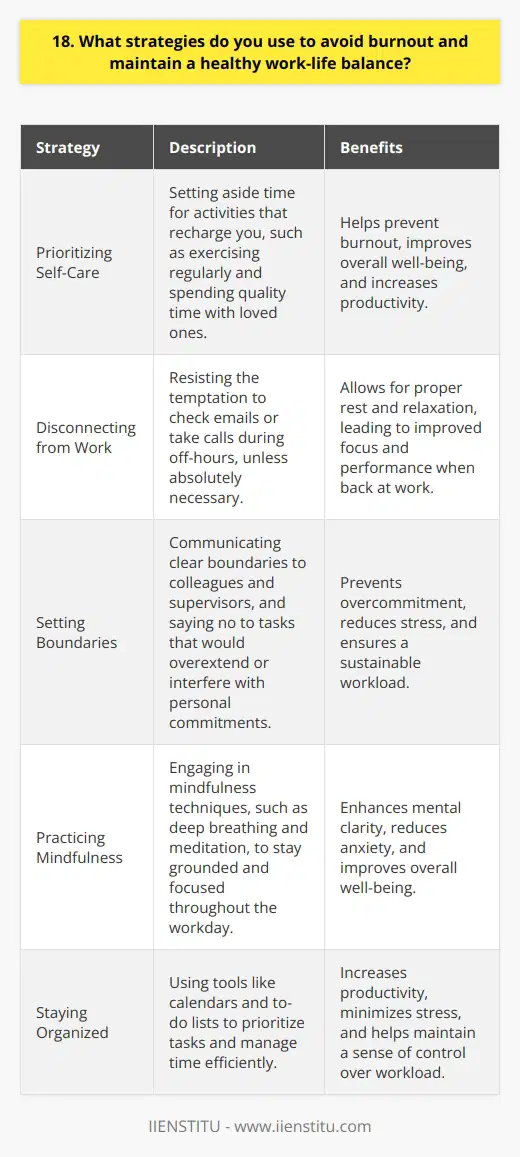
19. How do you handle emails and other forms of communication efficiently?
I handle emails and other forms of communication by prioritizing them based on urgency and importance. This allows me to respond to critical messages promptly while managing my time effectively.
Prioritizing Messages
I use filters and labels to categorize incoming emails, making it easy to identify high-priority items. For urgent matters, I aim to reply within an hour, ensuring timely communication.
Scheduling Time for Responses
To maintain focus and productivity, I set aside specific times throughout the day to check and respond to emails and messages. This keeps me from constantly switching tasks and helps me stay organized.
Keeping Responses Clear and Concise
When crafting replies, I strive for clarity and brevity. I address the main points directly, using simple language that's easy to understand. If a longer explanation is needed, I suggest a phone call or meeting.
Leveraging Communication Tools
I'm comfortable using various communication platforms, such as instant messaging and project management software, to streamline collaboration with colleagues. These tools help keep conversations organized and easily accessible.
Following Up
For important conversations or action items, I make sure to follow up if I haven't received a response within a reasonable timeframe. This ensures that nothing falls through the cracks and projects stay on track.
By implementing these strategies, I'm able to efficiently manage my inbox, respond to messages in a timely manner, and maintain clear communication with my team and clients.
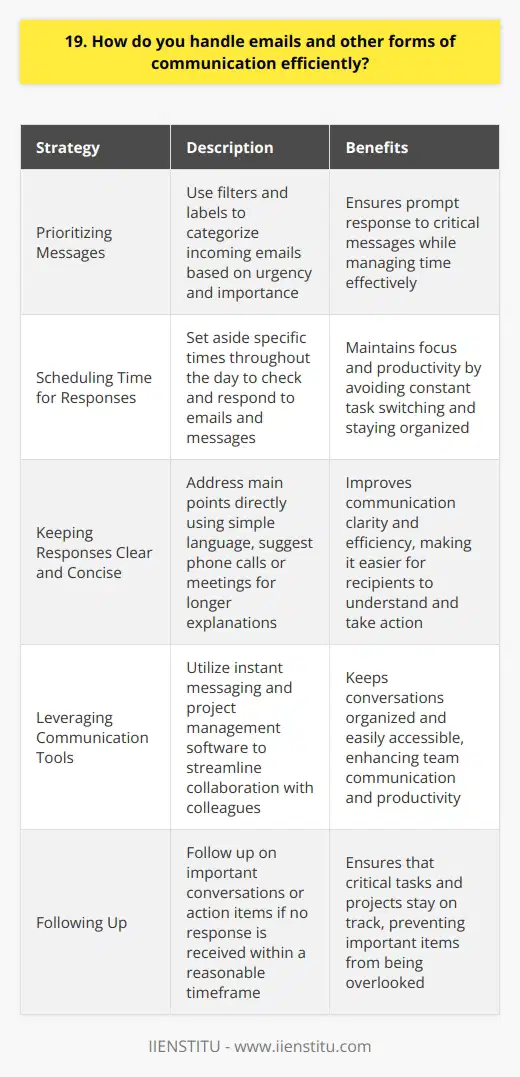
20. What techniques do you use to stay motivated and engaged in your work?
To stay motivated and engaged in my work, I rely on a combination of techniques that keep me focused and energized. One of the most effective methods I use is setting clear, achievable goals for myself. By breaking down larger projects into smaller, manageable tasks, I can track my progress and feel a sense of accomplishment as I complete each step.
Prioritizing Self-Care
Another crucial aspect of maintaining my motivation is prioritizing self-care. I make sure to take regular breaks throughout the day, even if it's just a few minutes to stretch or grab a healthy snack. These brief moments of respite help me recharge and return to my work with renewed focus and creativity.
Surrounding Myself with Positivity
I also find that surrounding myself with positive influences plays a significant role in keeping me motivated. This includes collaborating with supportive colleagues, seeking out mentors who can offer guidance and encouragement, and engaging in hobbies or activities outside of work that bring me joy and fulfillment.
Embracing Challenges as Opportunities
When faced with challenges or setbacks, I try to view them as opportunities for growth and learning. By maintaining a growth mindset and embracing the chance to develop new skills or find creative solutions, I stay engaged and driven to succeed.
Celebrating Milestones and Successes
Finally, I believe in the power of celebrating milestones and successes, no matter how small they may seem. Recognizing my achievements helps me stay motivated and reminds me of the progress I've made, even on difficult days.
By implementing these techniques and staying mindful of my own well-being, I'm able to maintain a high level of motivation and engagement in my work, ultimately leading to greater job satisfaction and success.
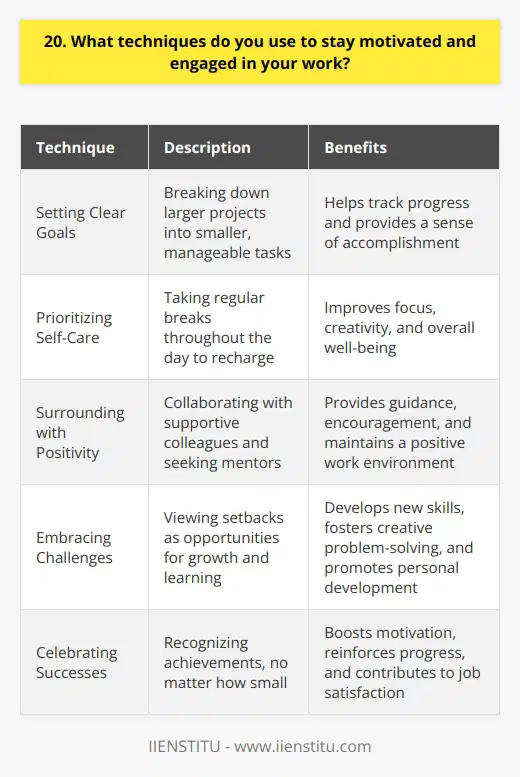
21. How do you handle tasks that you find boring or uninteresting?
When faced with boring or uninteresting tasks, I try to find ways to make them more engaging. For example, when I had to manually enter data into a spreadsheet for hours on end at my previous job, I challenged myself to see how quickly and accurately I could complete each batch of entries. This turned a mundane task into a game of sorts, keeping me motivated and focused.
Prioritizing Efficiency
I also prioritize efficiency when dealing with uninteresting tasks. Breaking them down into smaller, manageable steps helps me stay organized and maintain momentum. Setting mini-deadlines for myself keeps me accountable and ensures that I don't procrastinate or get bogged down in the monotony.
Finding Purpose
Another strategy I employ is trying to find purpose in even the most uninteresting tasks. I remind myself of how my work contributes to the bigger picture and supports my team's goals. Understanding the value of my efforts, no matter how small or tedious, helps me stay driven and committed to doing my best work.
Seeking Opportunities for Growth
Finally, I try to view boring tasks as opportunities for growth and skill-building. For instance, when I was asked to proofread hundreds of pages of technical documentation, I used it as a chance to hone my attention to detail and improve my editing abilities. By focusing on the transferable skills I'm developing, I can find more meaning and satisfaction in even the most uninteresting work.
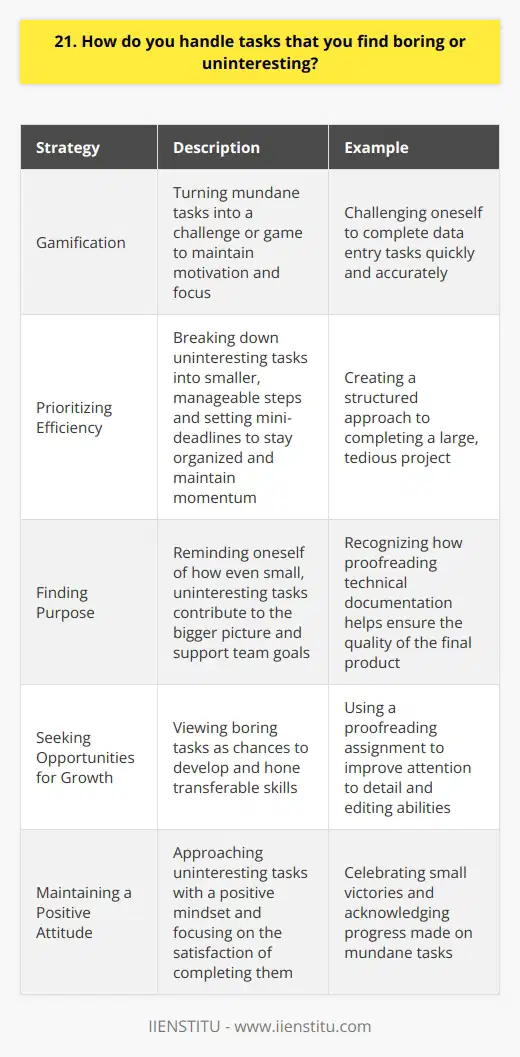
22. What methods do you use to improve your concentration and minimize distractions?
I have developed several strategies to enhance my focus and reduce distractions while working. These methods have proven effective in boosting my productivity and ensuring that I stay on track with my tasks.
Prioritizing Tasks
I start my day by creating a to-do list, prioritizing the most important and time-sensitive tasks. This helps me stay organized and ensures that I tackle the crucial assignments first, avoiding the temptation to procrastinate or get sidetracked by less critical matters.
Minimizing Digital Distractions
To minimize digital distractions, I turn off notifications on my phone and computer during work hours. I also use website blockers to prevent myself from accessing social media or other distracting sites while I'm focusing on a task. It's amazing how much more I can accomplish when I'm not constantly interrupted by notifications or tempted to check my social media feeds.
Breaking Tasks into Manageable Chunks
When faced with a large project, I break it down into smaller, manageable tasks. This approach makes the overall assignment feel less overwhelming and allows me to focus on one step at a time. As I complete each smaller task, I feel a sense of accomplishment, which motivates me to keep pushing forward.
Taking Regular Breaks
I've learned that taking short breaks throughout the day can actually improve my concentration. After working for a solid block of time, usually around 60 to 90 minutes, I step away from my desk and engage in a brief activity, such as stretching, walking, or grabbing a healthy snack. These breaks help me recharge and return to my work with renewed focus and energy.
Creating a Conducive Work Environment
Finally, I strive to create a work environment that promotes concentration. This includes finding a quiet space, maintaining a clutter-free desk, and ensuring that I have all the necessary tools and resources readily available. When my workspace is organized and comfortable, I find it much easier to stay focused and productive.
By implementing these strategies consistently, I have been able to significantly improve my concentration and minimize distractions, ultimately leading to better work performance and increased job satisfaction.
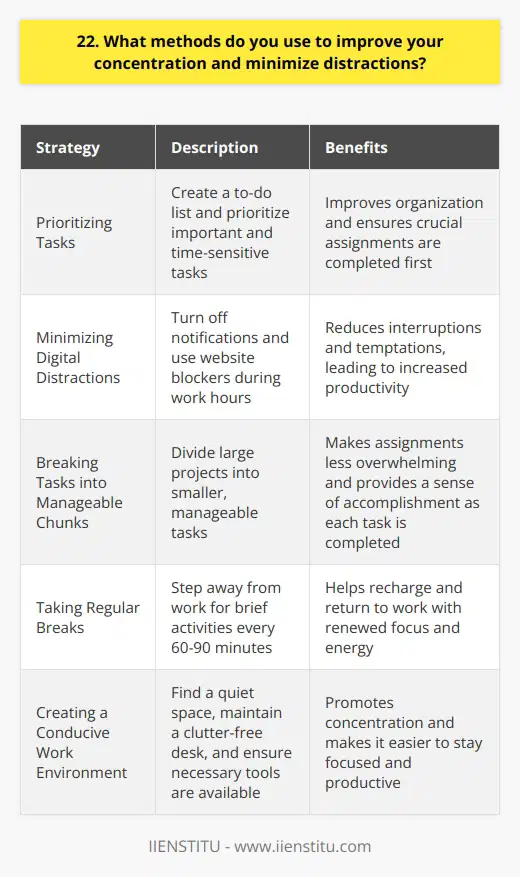
23. How do you prioritize self-care and maintain your physical and mental well-being?
Prioritizing self-care is essential for maintaining both physical and mental well-being. I make it a point to engage in activities that nourish my body, mind, and soul.
Regular Exercise and Healthy Eating
I enjoy going for morning jogs in the park near my house. The fresh air and endorphins help me start the day with a clear mind. I also make sure to eat a balanced diet, focusing on whole foods and staying hydrated.
Mindfulness and Stress Management
To manage stress, I practice mindfulness meditation for 10-15 minutes daily. It helps me stay grounded and focused. When I'm feeling overwhelmed at work, I take short breaks to stretch or do breathing exercises.
Hobbies and Social Connections
Engaging in hobbies like painting and playing the guitar allows me to express my creativity and unwind. I also make time for social connections, whether it's catching up with friends over coffee or having a game night with family.
Setting Boundaries and Saying No
I've learned the importance of setting boundaries and saying no when necessary. If I'm feeling overextended, I communicate my needs and limitations respectfully. This helps prevent burnout and ensures I have the energy to bring my best self to work.
By prioritizing self-care, I'm able to show up as my best self both personally and professionally. It's an ongoing journey, but I'm committed to making my well-being a top priority.
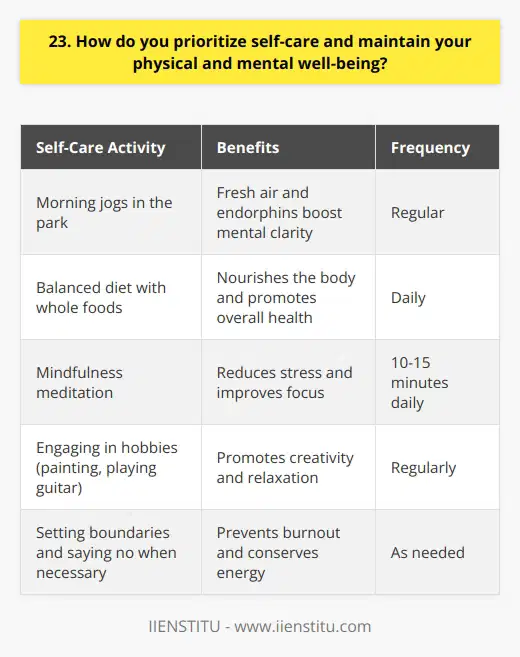
24. What strategies do you use to learn new skills and improve your time management abilities?
When it comes to learning new skills and improving my time management abilities, I rely on several proven strategies. First and foremost, I'm a firm believer in setting clear goals and breaking them down into manageable tasks. This helps me stay focused and motivated, even when facing challenging projects.
Prioritizing and Planning
I always start by prioritizing my tasks based on urgency and importance. Then, I create a realistic schedule, allocating sufficient time for each activity. I find that using a planner or a digital calendar keeps me organized and on track.
Continuous Learning
To expand my skill set, I actively seek out learning opportunities. I love attending workshops, webinars, and conferences related to my field. Online courses have also been a game-changer for me. Platforms like Coursera and Udemy offer a wealth of knowledge at my fingertips.
Hands-on Practice
I believe that the best way to master a new skill is through hands-on practice. Whenever I learn something new, I make it a point to apply it in real-world situations. This helps me retain the knowledge and gain confidence in my abilities.
Seeking Feedback and Mentorship
I'm always open to feedback and guidance from more experienced colleagues or mentors. Their insights have been invaluable in helping me identify areas for improvement and refine my skills. I make it a habit to regularly seek their advice and learn from their experiences.
By combining these strategies, I've been able to continuously grow both personally and professionally. I'm excited to bring these skills and my passion for learning to this role and contribute to the team's success.
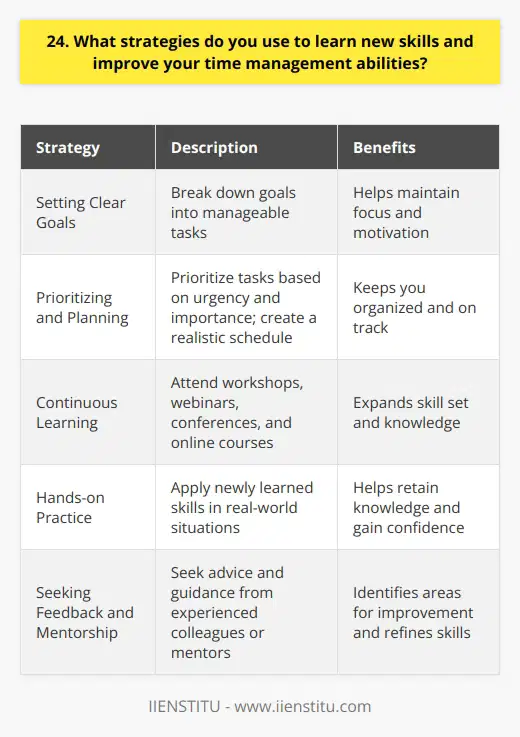
25. How do you handle procrastination when faced with challenging or unpleasant tasks?
When faced with challenging or unpleasant tasks, I have a few strategies to handle procrastination and stay productive:
Break it Down
First, I break the task down into smaller, manageable steps. This makes it feel less overwhelming and helps me get started. I focus on one piece at a time, which builds momentum and motivation to keep going.
Set Mini Deadlines
To keep myself accountable, I set personal deadlines for each step of the project. Having a timeline prevents me from putting it off and forces me to make steady progress, even if I'm not in the mood.
Reward Milestones
I incentivize myself by building in small rewards when I complete certain milestones. For example, after finishing a difficult portion, I'll treat myself to a coffee break or quick walk outside. Knowing I have something to look forward to keeps me going.
Optimize My Environment
I'm easily distracted, so I make sure my workspace is conducive to productivity. I silence my phone, close unnecessary browser tabs, and put on music that helps me focus. Creating the right environment sets me up for success.
Ask for Help
If I'm really struggling with procrastination, I'm not afraid to ask colleagues for help or advice. Sometimes an outside perspective is all I need to get unstuck and power through the task at hand.
With these strategies, I'm able to beat procrastination and deliver quality work, even when faced with daunting projects. It's an ongoing process, but I'm committed to tackling challenges head-on.
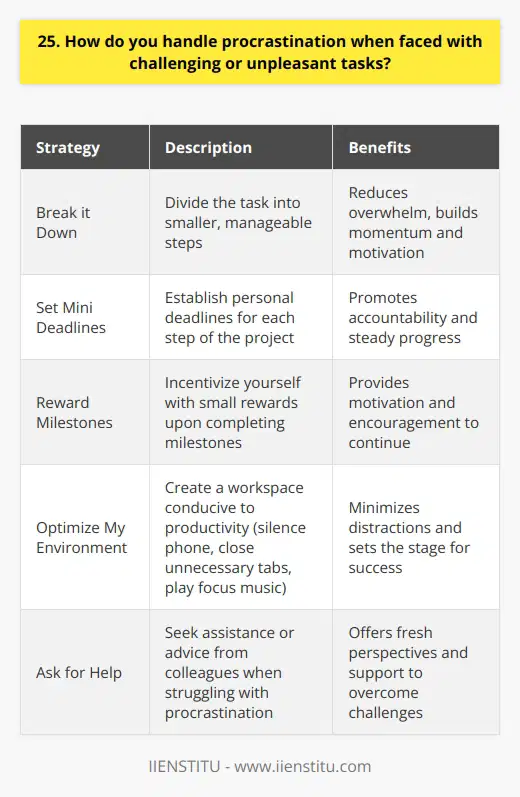
26. What techniques do you use to optimize your work environment for maximum productivity?
To optimize my work environment for maximum productivity, I focus on several key techniques. First and foremost, I prioritize my tasks and create a clear plan of action.
Prioritizing Tasks and Planning
I start each day by identifying the most critical tasks and allocating my time accordingly. By tackling the most important and challenging tasks first, I can make significant progress and maintain momentum throughout the day. I break down larger projects into smaller, manageable steps to avoid feeling overwhelmed and to ensure steady progress.
Minimizing Distractions
Another crucial aspect of optimizing my work environment is minimizing distractions. I find that turning off notifications on my phone and computer helps me stay focused. When working on a project that requires deep concentration, I put on noise-canceling headphones and listen to instrumental music to create a distraction-free bubble.
Creating a Comfortable and Ergonomic Setup
I also pay close attention to my physical workspace. I invest in a comfortable and ergonomic chair and desk setup to reduce fatigue and prevent strain on my body. I keep my desk tidy and organized, ensuring that I have easy access to the tools and resources I need.
Taking Regular Breaks
Surprisingly, taking regular breaks has been a game-changer for my productivity. I use the Pomodoro Technique, working in focused 25-minute intervals followed by short breaks. During these breaks, I stretch, walk around, or do a quick meditation to recharge my mind and body.
Collaborating and Communicating Effectively
Finally, I prioritize effective communication and collaboration with my team. I use project management tools like Trello and Slack to stay connected, share updates, and collaborate seamlessly. Regular check-ins and clear communication help ensure that everyone is aligned and working towards the same goals.
By implementing these techniques and continuously refining my approach, I've been able to create a work environment that fosters focus, creativity, and high productivity.
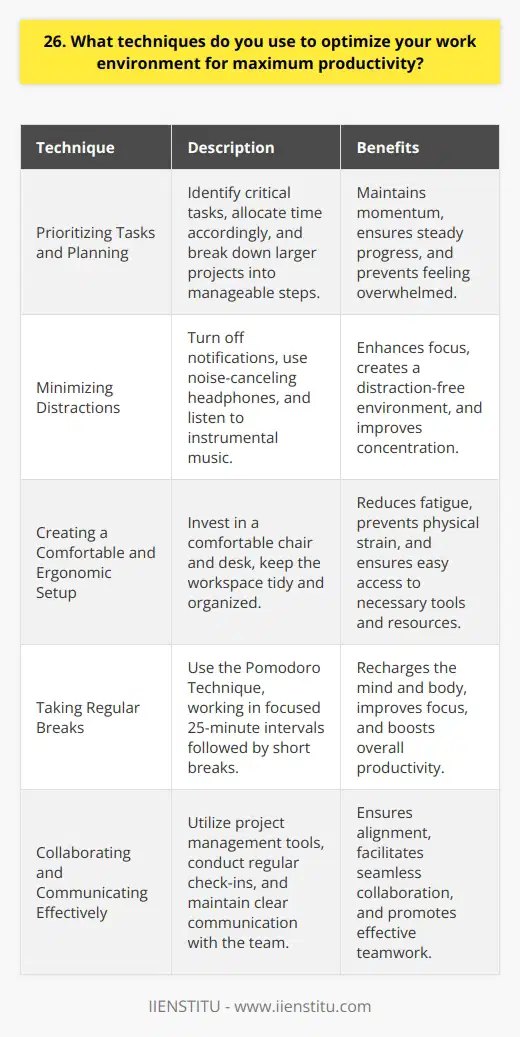
27. How do you handle interruptions from colleagues or superiors while working on important tasks?
When colleagues or superiors interrupt me while I'm working on important tasks, I handle it calmly and professionally. First, I acknowledge their presence and politely ask if it's urgent or if we can discuss it later. If it's not pressing, I suggest a specific time when I can give them my full attention.
Prioritizing Tasks
I prioritize my tasks based on deadlines and importance. If the interruption is related to a high-priority task, I quickly assess whether I need to shift my focus immediately. I communicate clearly about my current commitments and when I can realistically address their concern.
Minimizing Distractions
To minimize interruptions, I try to work in a quiet space or use headphones when possible. I also communicate my availability through status updates or blocking off focused work time on my calendar. This helps my colleagues understand when I'm deeply engaged in a task.
Collaborating Effectively
I believe in the power of collaboration and open communication. If interruptions become frequent, I proactively discuss it with my team or manager. Together, we brainstorm solutions like designated "focus hours" or alternative communication channels for non-urgent matters.
Staying Organized
Staying organized is key to handling interruptions effectively. I keep a detailed to-do list and timeline for my projects. This allows me to quickly pick up where I left off after an interruption without losing momentum or forgetting important details.
Embracing Flexibility
While interruptions can be challenging, I try to remain flexible and adaptable. I understand that unexpected issues or opportunities may arise, requiring me to adjust my plans. By maintaining a positive attitude and clear communication, I can navigate interruptions while still delivering high-quality work.
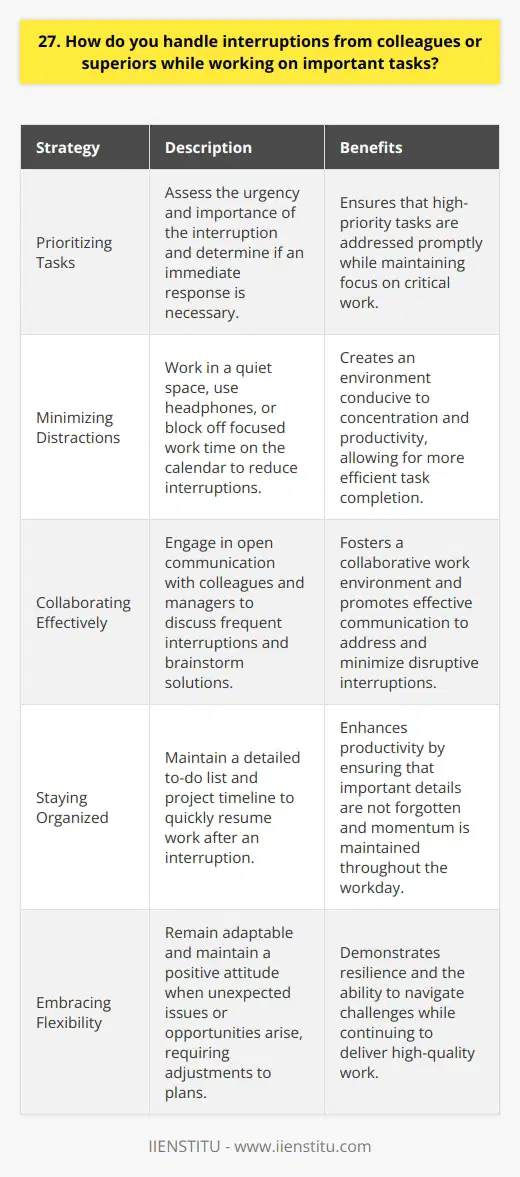
28. What methods do you use to ensure that you follow through on your commitments and meet your goals?
I believe that the key to meeting goals and following through on commitments is a combination of effective planning, prioritization, and self-discipline. Here are some of the methods I use:
Set Clear and Specific Goals
I make sure to define my goals clearly and break them down into smaller, manageable tasks. This helps me stay focused and motivated, as I can see my progress along the way.
Prioritize and Schedule
I prioritize my tasks based on importance and urgency. I use a calendar and to-do lists to schedule my activities and ensure that I allocate sufficient time for each commitment.
Hold Myself Accountable
I hold myself accountable by regularly reviewing my progress and making adjustments as needed. I also share my goals with a trusted friend or colleague who can provide support and encouragement.
Practice Self-Discipline
I believe that self-discipline is crucial for staying on track. I make a conscious effort to avoid procrastination and distractions, and I try to develop good habits that support my goals.
Learn from Setbacks
When faced with setbacks or challenges, I try to learn from them and adapt my approach. I don't let temporary failures discourage me; instead, I use them as opportunities for growth and improvement.
By using these methods consistently, I have been able to meet my goals and follow through on my commitments, both in my personal life and in my previous work experiences.
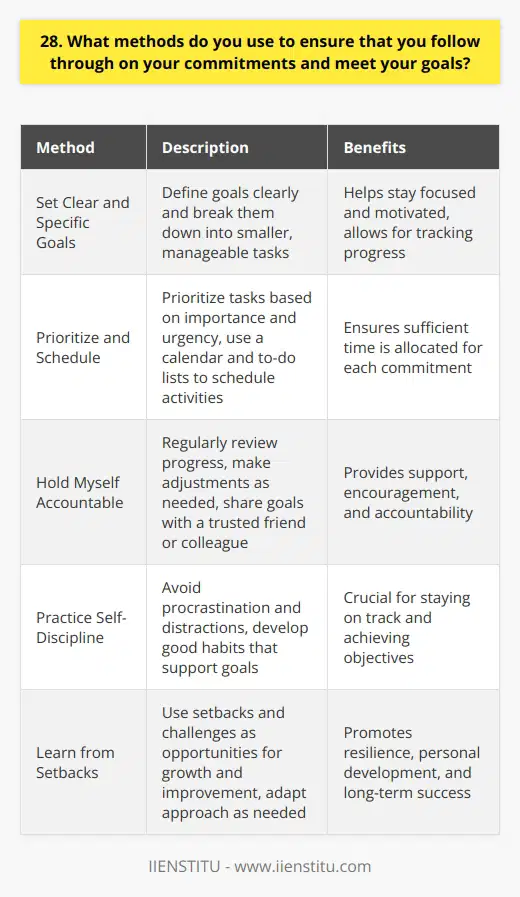
29. How do you prioritize tasks when everything seems equally important?
When faced with multiple tasks that seem equally important, I first take a step back and assess the situation. I consider the deadlines, the potential impact of each task, and the expectations of my team and stakeholders. This helps me gain a clear understanding of the priorities.
Categorizing Tasks
Next, I categorize the tasks based on their urgency and importance. I use the Eisenhower Matrix, which divides tasks into four quadrants: urgent and important, important but not urgent, urgent but not important, and neither urgent nor important. This framework helps me identify the tasks that require immediate attention.
Communicating with the Team
I also communicate with my team members and managers to gather their input and insights. Their perspectives often shed light on the relative importance of each task and help me make informed decisions. Collaboration is key in ensuring that everyone is aligned on the priorities.
Breaking Down Tasks
Once I have a clear understanding of the priorities, I break down the tasks into smaller, manageable steps. This allows me to focus on one thing at a time and make steady progress. I set realistic goals for each day and week, taking into account any potential roadblocks or dependencies.
Staying Flexible
Throughout the process, I remain flexible and adaptable. Priorities can shift unexpectedly, and new tasks may arise. I regularly reassess my priorities and adjust my plan accordingly. By staying agile and responsive, I can ensure that I am always working on the most critical tasks.
In summary, prioritizing tasks when everything seems equally important requires a combination of strategic thinking, effective communication, and adaptability. By categorizing tasks, collaborating with the team, breaking them down into manageable steps, and staying flexible, I can navigate competing priorities and deliver results that drive the success of the organization.
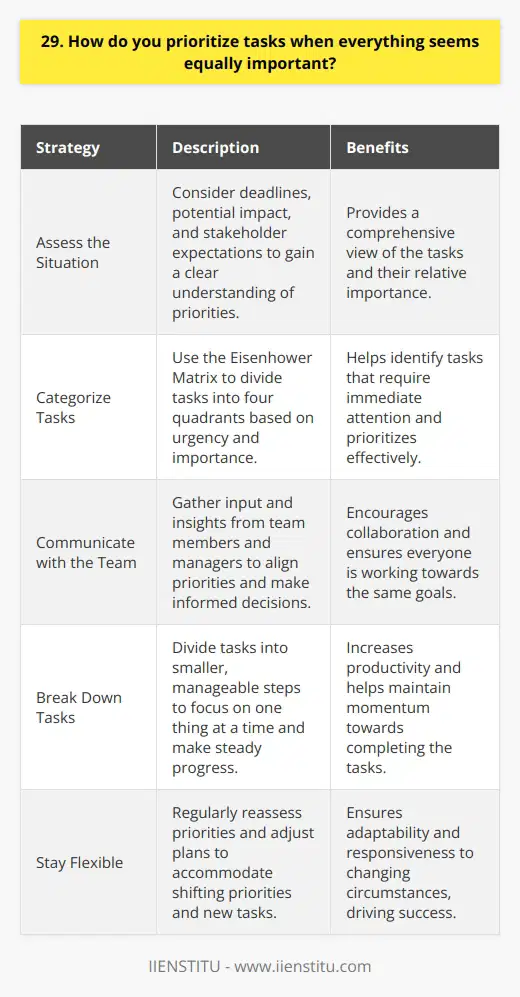
30. What strategies do you use to maintain a positive attitude and stay resilient in the face of setbacks or challenges?
I believe that maintaining a positive attitude is crucial for overcoming challenges and achieving success. When faced with setbacks, I try to focus on the lessons I can learn from the experience. By viewing obstacles as opportunities for growth, I am able to stay motivated and resilient.
Practicing Gratitude
One strategy I use to stay positive is practicing gratitude. Each day, I take a few moments to reflect on the things I am thankful for, no matter how small they may seem. This helps me to keep things in perspective and reminds me of all the good in my life, even during difficult times.
Surrounding Myself with Positivity
I also make an effort to surround myself with positive influences. I seek out the company of optimistic and supportive people who encourage me to keep pushing forward. When I'm feeling down, I reach out to friends and family members who I know will offer words of encouragement and help me to see the bright side of things.
Focusing on Solutions
When confronted with a challenge, I try to focus on finding solutions rather than dwelling on the problem. I break the issue down into smaller, manageable steps and tackle them one at a time. By taking action and making progress, no matter how small, I am able to maintain a sense of control and keep a positive outlook.
At the end of the day, I believe that a positive attitude is a choice. By consciously choosing to focus on the good, practicing gratitude, surrounding myself with positivity, and actively seeking solutions, I am able to stay resilient and overcome any obstacle that comes my way.
